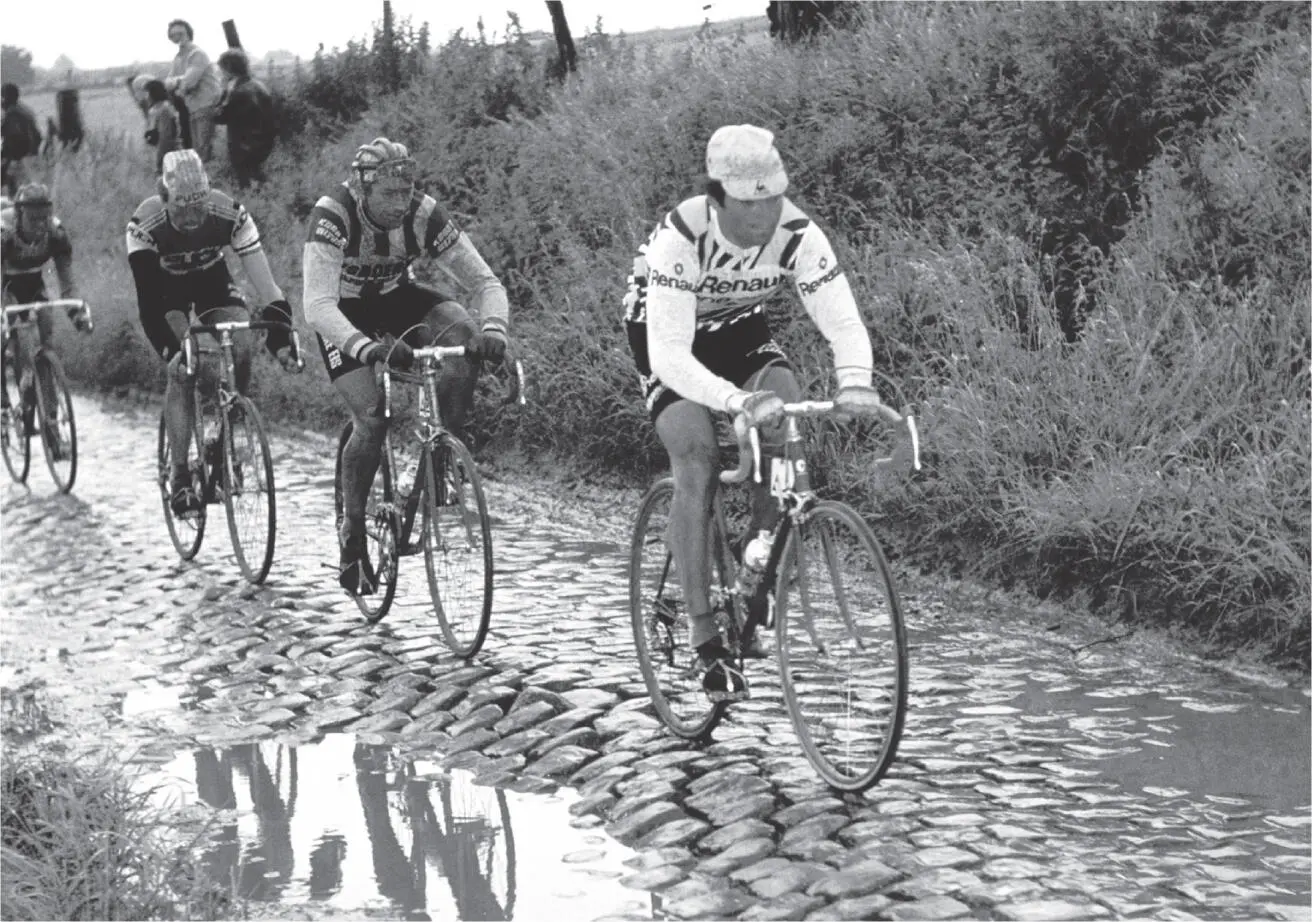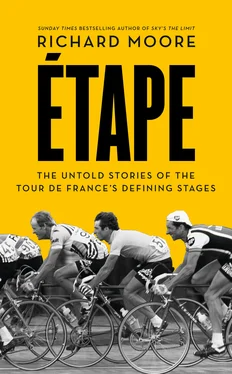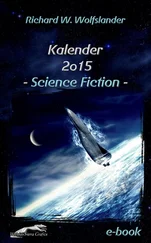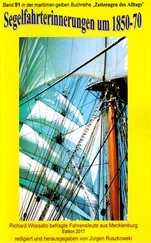‘Cinq ... Quatre ... Trois ... Deux ... Un ...’
Boardman shot into a corridor of people: there was a huge crowd, six deep, lining the straight, pouring over the barriers, leaning into the road. Boardman sprinted, out of the saddle, before settling into his extreme position: arms stretching over the front wheel, head down, like a bullet. He remembers little of the ride. He doesn’t recall it being painful. ‘They tend not to hurt if you’ve got it right and you’re fresh, which I was.’
The rider who started a minute in front of Boardman was Luc Leblanc, who had been so dismissive of his hour record a year earlier. The contrast in styles was remarkable: the bare-headed Leblanc, his brown hair blowing in the wind, on a bike on which he didn’t look comfortable, shifting in the saddle, frequently standing up for more power – which, as Boardman knew, came at the cost of aerodynamics. Boardman had clocked Leblanc as he waited in front of him, ‘on a bike you could quite literally go and buy in [the sports shop] Decathlon. Probably 44cm [wide] bars.
‘Even if he’d been producing the same power as me, he’d have lost at least a minute …’
There was something else that Boardman knew, though he doesn’t say whether he derived any special advantage from the knowledge. Having the team car behind you could serve as an aerodynamic aid: ‘People don’t realise that having a car up your butt makes a bloody big difference. Because turbulence goes behind you and sucks you backwards, having a car behind you is beneficial. It’s 20 watts difference.’
All the riders had cars behind them, but perhaps Boardman’s was closer (it was certainly close the following year, when Boardman fell in the rain at Saint-Brieuc, and was almost run over, ending his second Tour within a few minutes of it starting).
In Lille, Boardman knew he was on a good day, but didn’t know how he was going relative to anyone else. For those watching on television, too, there was scant information; the action was mainly transmitted from a fixed camera on the finish line, which tracked the riders as they sprinted up the long, wide, gently rising finishing straight – all of them fighting, weaving from one side to the other in search of a smoother surface or the most sheltered spot, getting out of the saddle to try and generate more power.
Boardman was careful not to start too fast. He was wary of getting carried away by the occasion; the people cheering, the realisation that he was riding the Tour de France – the Tour de France! The knack to riding a good time trial is always the same: it’s all about pacing, judgement, calculation. Things that Boardman is good at. ‘The equation in my head, in any time trial, was: how far is it to go; how hard am I trying; is it sustainable?
‘And that changes depending on how far you have to go. If the answer is “Yes, it is sustainable,” then you’re not trying hard enough. If the answer is “No, I can’t sustain it,” then it’s too late.
‘So the answer you’re looking for is: “Maybe.”’
For the entirety of his ride, Boardman remains in his aerodynamic position: bum up, head down, only shifting slightly for corners. He knows where he has to touch the brakes, where he doesn’t. And as he enters the long finishing straight, he can see, in front of him, his minute-man, Leblanc.
‘Look at this!’ says Liggett on commentary. ‘The arrival of Chris Boardman! He has almost caught Luc Leblanc!’
‘I thought that was perfect,’ says Boardman, a wry smile playing on his lips. ‘After Bordeaux, he says that half the peloton could break the hour record. And next year, I catch him for a minute …’
Leblanc gives Boardman a target to aim at in the final kilometre: a big, 44cm-wide, off-the-peg bike-shaped target, hair billowing in the wind. Now it is impossible not to be struck by the contrast. Leblanc is a diminutive climber but he looks twice the size of Boardman.
Boardman aimed for his back wheel. ‘The straight was long, and seeing Leblanc allowed me to change strategy slightly.’ This was where the answer to the question always in his mind – ‘Can I sustain this effort?’ – went from ‘maybe’ to ‘no’. But it didn’t matter. It would be over soon. ‘When you see something coming up and think, “I can push on a bit more and get a ‘reward’ before the end…”’ The reward being the catch. ‘That helped quite a bit.’
Leblanc, riding up the right-hand gutter, becomes aware of the Exocet missile behind him, turns around to glance over his shoulder, then moves over as Boardman, who had seemed to be toying with which side to pass him on, rockets up the inside. The time to beat is 8 minutes, 13 seconds, by Armand de Las Cuevas. Boardman speeds through the line: 7:49. The fastest time by 24 seconds. And at 55kph, the fastest time trial the Tour has ever seen.
Boardman already knew it had been a good ride. ‘It was one of the very few moments in my entire career where I could not have done anything differently. It was perfect. They don’t hurt, you just can’t go any faster.’
He looks a little wistful as he adds: ‘I never got those conditions again.’
There’s no time to linger on Boardman in the aftermath of his ride; we see him freewheeling into a mass of bodies and disappearing. The camera flashes instead to an expressionless, yellow-jerseyed Indurain in the start house. Three seconds later, his countdown begins. Eight seconds after Boardman finishes, he starts.
Indurain, the last of the 189 riders, hammers around the course. His time trialling had let him down at the recent Tour of Italy, where he finished second to Evgeni Berzin. But now he looks formidable. Whereas Boardman was compact and bullet-like, Indurain is a blunt instrument: he bludgeons his way through Lille’s broad boulevards. He gets out of the saddle: a rare sight. His mouth is open, gasping for air: also a rare spectacle. He’s usually so cool, so impassive. Finally he appears, swinging around the final bend, on the brink of his third consecutive prologue victory – or is he? The clock reads 7:40. ‘It’s a long, long way to go, Miguel,’ Liggett’s voice crackles with emotion.
The clock counts on: 7.44 … 45 … 46 … 47 … 48 … 49 … And still Indurain powers up the finishing straight. Liggett again: ‘Boardman is the leader of the Tour de France! He’s done it!’
Indurain lunges across the line and the clock stops at 8:04: a full 15 seconds slower than Boardman.
Boardman remembers little of that eight-minute wait. ‘It’s a blur. You do something, there’s loads of noise, then people say: “You’ve done it!” And that’s the first time you start to have self-belief.’
Boardman is perhaps not as impassive as Indurain, but he is not exactly emotional, or sentimental. ‘I was happy,’ he says. Then corrects himself: ‘ Relieved . That there had been this opportunity and I’d taken it. I had done what I came for.’
Classement
1Chris Boardman, Great Britain, Gan, 7 minutes, 49 secs
2Miguel Indurain, Spain, Banesto, at 15 secs
3Tony Rominger, Switzerland, Mapei-Clas, at 19 secs
4Alex Zülle, Switzerland, ONCE, at 22 secs
5Armand de Las Cuevas, France, Castorama, at 24 secs
6Thierry Marie, France, Castorama, at 29 secs

Bernard Hinault Leads Over the Pavé Early in the Stage

Читать дальше














